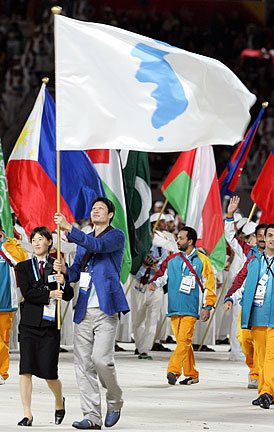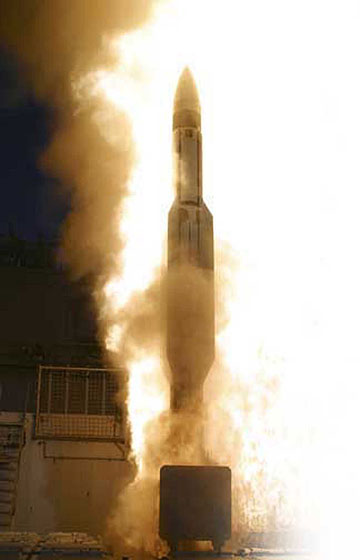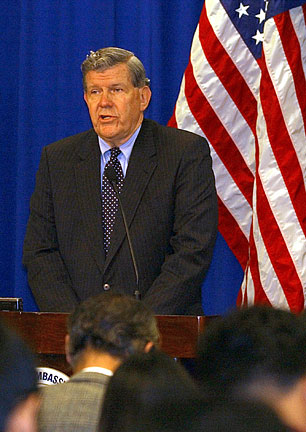
ASSOCIATED PRESS
Although North and South Korea have never competed as a unified team, athletes from the two countries marched together Dec. 1, during the opening ceremonies of the Asian Games in Doha, Qatar.
|
|
Crossroads for Korea
As international tensions flare over nuclear arms, Pyongyang and Seoul seek common ground
UNDER A BLUE AND WHITE FLAG showing an undivided peninsula, teams from South Korea and North Korea marched together at the opening ceremonies of the Asian Games Dec. 1 in the Persian Gulf capital of Doha, Qatar.
The athletes are competing separately during the so-called Asiad, but negotiations were held to field a single team at the 2008 Olympics in Beijing. The major stumbling block: South Korea insists the Olympic team be selected on the basis of athletes' records; North Korea is pushing for equal representation from both nations.
The dramatic display of unity at the Asian Games and the debate over the 2008 Olympic roster illustrates the promise and the pitfalls of inter-Korean relations.
North Korea's stance suggests that the regime is less interested in assembling a competitive squad than in garnering respect -- or at least the trappings of respect. The government cares less about winning, apparently, than its image on the international stage.
A skewed view of what's sensible also seems to infect its geopolitical posture, threatening stability in Northeast Asia and complicating the increasingly strained U.S.-South Korean alliance.
One example: North Korea apparently thinks it's reasonable to counterfeit U.S. $100 bills.
When confronted with that and other accusations by the U.S. Treasury in the fall of 2005, the North Koreans promptly walked away from the six-nation negotiations aimed at eliminating its fledgling nuclear arsenal. Only recently, after more than a year, have they agreed to return to the table.
South Korea, intent on ultimate reunification, continues to spar with gloves on.
After the U.N. Security Council sanctioned Pyongyang for its Oct. 9 nuclear test, the Bush administration pushed Seoul to take a step further. Under the U.S.-led Proliferation Security Initiative, it was asked to interdict shipments to and from North Korea suspected of containing weapons of mass destruction or associated technology.
Seoul said no.
In Australia last Wednesday, according to Reuters, South Korean President Roh Moo-hyun admitted he wanted to avoid antagonizing his neighbor.
"Korea knows the North Koreans the best," Roh said through an interpreter. "We are experts, in fact, in dealing with them."
While South Korea had imposed sanctions in line with the U.N. resolution, Roh said, "My government's position is it is wise to restrain from actions that could cause a physical armed confrontation between the two Koreas."
That might be prudent, given that North Korea responds poorly, even petulantly, to challenges.
After abstentions in previous years, South Korea on Nov. 17 helped pass a resolution before the U.N. Third Committee, which addresses humanitarian issues, condemning human rights violations in the North.

COURTESY U.S. NAVY
A missile, launched from the Aegis cruiser USS Lake Erie, was fired in a recent test of the ballistic missile defense system. The missile attempted to intercept a target launched from the Pacific Missile Range Facility at Barking Sands, Kauai.
|
|
The reaction from Pyongyang was vehement, with its representative calling the measure "a political plot of the United States and its satellite countries." It passed 91-21.
The resolution also calls on the U.N. secretary-general to submit a comprehensive report on the human rights situation in North Korea. As it happens, that task falls to the incoming secretary-general, former South Korean Foreign Minister Ban Ki-moon, who in dealing with Pyongyang might be required to display balancing prowess worthy of the Cirque du Soleil.
BY SOME ACCOUNTS, North Korea still has not fully recovered from President Bush's State of the Union address in 2002, when he tagged it as part of an "axis of evil" with Iraq and Iran.
The second shoe dropped in October of that year when James Kelly, then assistant secretary of state, flew to Pyongyang to accuse the regime of conducting a secret uranium enrichment program in defiance of a Clinton-era treaty called the Agreed Framework.
Some critics argue that the evidence --- purchases of centrifuges that could be used for enriching uranium, but not necessarily weapons-grade uranium --- was as spurious as the Bush team's claims of WMD in Iraq.
Korea scholar Selig Harrison, writing in the February 2005 issue of Foreign Affairs, said the centrifuges likely were for civilian use.
"Relying on sketchy data, the Bush administration presented a worst-case scenario as an incontrovertible truth and distorted its intelligence on North Korea (much as it did in Iraq), seriously exaggerating the danger that Pyongyang was secretly making uranium-based nuclear weapons," wrote Harrison, director of the Asia Program at the Center for International Policy in Washington, D.C.
Kelly's delegation went home believing that North Korea admitted to the clandestine program, but Harrison has suggested that the Pyongyang officials were deliberately vague, claiming only that they were "entitled" to such a program to deter a U.S. attack.
Newsweek on Oct. 15 went as far as to suggest that the U.S. diplomats were misled by an error in translation.
In an interview last Monday, Kelly, a part-time Honolulu resident for 27 years, called those assertions "outrageous."
Now retired, Kelly insists the evidence -- some of it still classified -- was incontrovertible and that there were no dissenting opinions among intelligence officials.
"Unlike some of the things that happened with Iraq, there was no disagreement at all," he said. "And I was looking for skepticism because I wanted to be skeptical."
The scale and dimensions of the gas centrifuges precisely matched what North Korea would need to enrich uranium for weapons, he said.
"Why does a country pursue uranium enrichment when it has plutonium reprocessing? The answer is, it is easier to conceal."
When the North Koreans, led by First Deputy Foreign Minister Kang Sok Ju, returned with a response to his accusations, Kelly recalled, the mood was calm.
"There were repeated admissions, repeated references to uranium enrichment," he said. "This was not an emotional presentation and it was lengthy, about 40 minutes, speaking from a prepared text. The atmosphere was not charged. There was no shouting or raising of voices."
Afterwards, Kelly and his team, including three note-takers who were fluent in Korean, met at the British Embassy and went over the statement. While their version has not been released publicly by the State Department, he said, he remains confident in its accuracy.

ASSOCIATED PRESS
Then-U.S. Assistant Secretary of State James Kelly spoke to reporters during a press conference at the U.S. Information Service in Seoul on Oct. 19, 2002. Kelly, a special envoy for President Bush, said the United States planned to bring "maximum international pressure" on North Korea if it did not immediately dismantle its nuclear weapons program.
|
|
"I think that people are going to be sorting through this for a long time," Kelly said. "But the basic fact is, North Korea very much wants to have nuclear weapons, and they have been working on it for more than 40 years."
THE IMMEDIATE upshot was that the United States cut off fuel oil shipments to North Korea as promised under the 1994 Agreed Framework, and North Korea withdrew from the Nuclear Non-Proliferation Treaty. It also kicked out inspectors from the International Atomic Energy Agency and restarted its dormant nuclear reactor and reprocessing plant at Yongbyon.
Since then, the North has continued its steady march toward a nuclear arsenal and a battery of long-range ballistic missiles.
Ongoing shipboard missile defense tests off Barking Sands, Kauai, are one answer to that threat, but so far an imperfect one.
Kelly and others express hope that the six-party talks, which include China, Russia, Japan and South Korea, still can succeed in easing nuclear tensions on the Korean Peninsula.
Until such time, concerns about Pyongyang's arsenal and intentions will dominate the regional agenda, coloring already difficult negotiations between the United States and South Korea concerning troop strength, wartime operational command, free trade in rice, autos and pharmaceuticals, and fears of mad cow disease in U.S. beef shipments.
Let the Asian Games in Qatar stand as our beacon of hope.
Jim Borg is a copy editor at the Star-Bulletin and a part-time editor for Yonhap Korean News Agency's English-language wire service.

